 |
|
Join us in congratulating our
authors!
Stories From The Heart, Vol. 2 just made it onto
Amazon.com's
bestseller list! And we had an Ice Cream
Social to celebrate!
See the festivities -- as the authors read their works onstage:
"The section I most enjoyed was
a few punning stories about cats by the late Earl Boretz, which were
most amusing. His characters include Count Fe-Line the cat burglar in
'Pussy Footin’ Around'; Sinister, the three-legged pirate cat and
Sorrowful, the witch. Overall, an entertaining collection..."
Cecilia Blight, THE NATIONAL ENGLISH LITERARY MUSEUM, Nelm News,
Grahamstown, South Africa
|
|
Have your own story to
tell? Check out.... |
 |
|
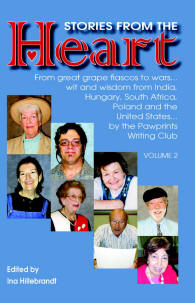
Excerpts below to savor.

See the authors read |
Greetings,
tale fans! For a great anytime gift, order your copy now of our
hot-off-the-press book of extraordinarily well-written memoirs! With
the added treat of sketches by world renowned artist Andre Van Zijl and
Jane Madeline.
"Stories From the Heart, Volume II"
... From great grape fiascos to wars ... wit
and wisdom from India, Hungary, South Africa, Poland and the United
States is now available through Amazon.com.
Inspire your
parents to write so that you have the tales of their lives forever.
Give the gift of this captivating anthology to them, and to everyone in
your life who loves a good laugh, a poignant moment and a look at times
past, in the United States and other spots 'round the globe. Or
write your own. See below.
|
 |
|
The stories
below -- and 200+ pages filled with more gripping as well as funny tales
-- are now available to you in the book that just made Amazon's bestseller
list! Click here to read reviews, and to buy
Stories From the Heart. Vol.
2.
Also available:
our new
How to Write Your Memoirs -- Fun
Prompts to Make Writing -- and Reading -- Your Life Stories a Pleasure!
Interested in forming your own Footprints Writing Club, or joining our
Footprints Online Writing Club? It's easy! Just click the button to find out how.

Workshops and Training
Now Available: To
learn more about how to set up Pawprints Adult Creativity or Senior Memoir Writing Workshops™
in your area, send us an e-mail at
inah@InasPawprints.com, or
call Pawpress at 310-471-5048.
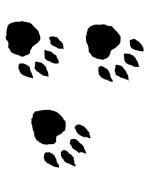


|
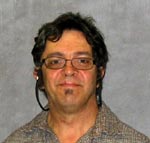
|
MEET ANDRÉ VAN ZIJL
André Van Zijl is a rare talent. His
original muse led him to become an exceptional visual artist, with works
in museum collections around the world. Moved by events around him, André
also penned political pieces in his native South
Africa, speaking out during turbulent pre- and post-Apartheid times. Now in Los Angeles,
André is writing his first book, the
masterful A Country Not Made By Men,
based on his life in country; an excerpt from the first chapter is shown
below. We count ourselves very fortunate indeed to
have André in our midst. Check for the video coming soon!
|
|
A Country Not Made By Men
By Andre van Zijl
Chapter One:
Missa Luba
The silence is all there is.
It is the alpha and the omega. It is God’s brooding over the face of
the waters; it is the blended note of the ten thousand things, the
whine of wings. You take a step in the right direction to pray to this
silence, and even address the prayer to the “World.” Distinctions
blur. "Quit your tents. Pray without ceasing”; Annie Dillard ‘Teaching
a Stone to Speak.’
Dirge-Song
His remains fall from the
sky. Gray billowing wings dust the bleating rumps of seven gemsbok,
galloping below. John and I lean back as the twin engine Cessna banks
left over a sliver of gilded horizon. Sunset flares in the distance
with fat summer cumuli emptying their bellies over the Kalahari
Desert. We sigh with relief, we have fulfilled our father’s last
request: his pagan wish to have his ashes spread over the hunting
grounds of his youth. Images of his brick red face and the enveloping
calm of his seemingly Titan presence engulfs us as we sit back into
the folding night, children again.
Pearlie has finally agreed to relinquish most of his ashes, as if
finally admitting to herself that dad wouldn’t spontaneously resurrect
before Judgment Day, wouldn’t somehow reconstitute himself, (pour a
little holy water and stand back!). However much she wants it, he
wouldn’t be walking away from the ‘noisome slings and arrows’ of the
Big ‘D’. He wouldn’t be escaping the bedroom closet, the copper urn
nestled quietly between his clean socks and folded ‘hankies’. She
carefully pours a large part of what remained of my father into a
cardboard shoebox. Self-consciously she retains some remnant, (should
he finally cheat the inevitable entropy of all flesh). This last
possibility not at all a long shot in my mother’s book, since she is
of the view that she will not die, but be taken up to the Lord in a
fiery chariot, whole and incorrupt.
Attie, my father’s nephew, comes to me at my father’s funeral. He is a
tall man, a protea farmer for the international flower market. His
puce face is clenched, enduring deep emotion. I am standing in the
vestry of a pretty thatched granite church. Rain on roseate Victorian
stained glass declaring the victory of the Cross. Clergy are preparing
to send off one of their own… Surrounded by the stiff rustling of
studied virtue, starched vestments and averted eyes, Attie’s
stuttering words become an island upon which we now stand, staring
into each other’s eyes. Attie’s bloodshot eyes fill with un-spilled
grief. Our feet stand on desert soil, far from here.
"Andre, I have come to tell you something about who your dad was. I
lived with him in the same room when I was a youngster after the
war, and hell, man, I’ve just got to tell you how I felt about your
dad. When I saw him, I said this is the kind of man I want to be when
I grow up. If there was someone who could ever be a hero, he was. I’ll
never forget his legs. No one ever had legs like him! Hey I know we’ve
got to go in to church now, but I’ve got to quickly tell you this one
thing... Hell, I’m sorry.
"We were out hunting gemsbok without any bloody permits in the
Kalahari. It was late winter. We come over a helluva high dune and
surprise thirteen of the buggers. We chased them in the Chevy
International, up and down the steepest dunes. The sand there is red,
red like your blood. Willie was the shooter.
"He stood in the back of the truck. The herd split. The leader, the
biggest male, turned us away from the female and young ones. He led a
small group of males balleka-ing like crazy in front. We chased them
deep, doerrr-n-gone into the bloody desert. On the edge of a ridge of
sand high above us he suddenly stopped, turning to face us. His sides
were wet in the sunlight as he turned to stare at us. The rest of them
vanished down the shadow of the dune. His eyes bulged yellow as he
blew foam and steam out of his mouth like a steam engine. His horns
corkscrew straight behind him. He was blerry ready to take us on. Just
standing there. We sat in the cab waiting. Waiting for your dad to
shoot.
"We began to shout, 'Skit man, skit!' But nothing … The antelope showed us
his backside and disappeared. We turned, moaning. Uncle Willie was
standing in the back, tears streaming down his face.
"He whispered, 'I couldn’t shoot such a thing of beauty.'
"Can you believe that!? That’s the kind of man your dad was." Attie
clung to me and broke down. The first display of emotion in all the
years I had known him as a distant aspect of our disheveled clan.
Ragged singing brings us back to the church. I find my family one pew
from the front. They are a frayed knot of grief. The organ plays "And
did Those Feet Step Upon England’s Green and Pleasant Land," and the
exquisite pain of boarding school washes over me ... St. Anne’s rector
begins the service: "Whilst alive, Reverend Willie deeply offended
many in the church, but that is past now. We forgive him. Let us
pray."
Incense wafts over our bowed heads … "Holy Smoke" my father called it.
Scones, jam and cream with tea are served in the church hall. We
endure the inevitable pleasantries from strangers. The self-conscious
rituals of well-meaning comfort ring hollow as a dried up well. Tongue
cleaves to mouth when life enters the room.
............
© Andre Van Zijl,
posted with the author's permission |
|
|
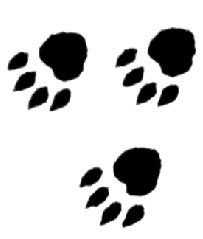

 |
|
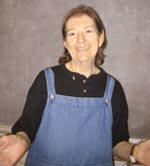 |
Meet Jane madeline
Jane is a continuing surprise.
Her journeys back to a "simpler time" show life really wasn't necessarily
simpler at all, but it certainly was filled with adventure, hard knocks,
sleigh rides (that in other parts of the country would be called sled
rides), ketchup and frogs (coming!) and lots of other interesting stuff.
Readers jump right into Jane's unique verbal paintings. |
|
THE GOLF COURSE IN
WINTER
By Jane Madeline
I love golf courses. All the kids from our town really
loved the driving range on Market Street.
We loved it best in winter. The range was next to Franklin School and
down the street from Kooger Farms. It was on a hill. As you stepped up to the
tee to drive the ball, the right side of the course fell away in a steep slope till
it became level with the street and swamp of reeds, cattails and frozen water in
winter.
In the summer we all
would enjoy the driving range as we became old enough to hit the balls. And if you were a girl, old enough to flirt
with the cute ball boys that didn’t seem to be from our town. But in the winter, the range was closed down
while the owners went to Florida, and we would use the big wonderful hill for
sleigh riding!
And
sleigh riding was special to us kids. It wasn’t just, “Lets go down the hill”
sleigh riding. THIS WAS MAIL TRAIN/ CRACK THE WHIP sleigh riding! In mail train we would create a line of
sledders, each one holding onto the one in front with our gloved hands and
holding onto our own sleds with the crooks of our feet. The
last sled on the
train had the mail. It was the
designated target sled. And the simple
rule was DESTROY THE MAIL TRAIN as it careened on down the hill. The attack sleds took their orders seriously.
The excitement of danger was the added elixir to our snow fun. I do remember being part of the train and
feeling the glee of flying fast down the hill being chased by bigger sleds whose
riders were determined to catch us. Most
of the time they did. And we would laugh
and roll over in the icy snow or yell and cry out, “Not Fair!” or “You
cheated!”
I
remember my friend Roy’s sled. It belonged to his father whose mother came from
Norway. It had wide, wide runners and
could fit five people. It was that long -- twice as long as a normal sled.
We all had sleds of one type or another, and the best part
was coming home after a hard day on the slopes -- being exhausted at being
caught or chased all day. We would undo
our snow-armor -- shiny galoshes with metal buckles that interlaced with each
other and held tight together, mittens, leggings, sweaters, knitted helmets
with exposure for eyes and mouths only, and stiff, shiny snow-jackets now wet
from ice and snow. Of course while we were away all day we ate the snow for
thirst and because it felt clean and cool and crisp and crunchy in your mouth,
and made a funny noise in your ears as you chomped on it. But now we were
seriously hungry and thirsty, too. Our mother had dinner all ready and we ate
well, my brother and I, as the wet clothes steamed in front of the fireplace. The fireplace actually had no fire in it, its
heat came up through the grate from the coal fire that my father kept going in
the basement all day during the cold New
Jersey winters.
These were the winters of growing-up time for all of us.
Soon it would change to college/going away/getting married/getting older. How I
now cherish the times we had then, the people, the snow, the mystique of a cold
winter evening and a warm, happy loving feeling.
© Jane Madeline, posted with the author's permission
|



|
|
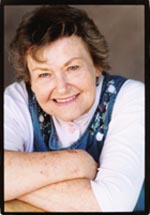
|
MEET KAY
ROBERTS
Kay has a lively and
entertaining way with the written word that matches her ability to read
aloud and capture any audience. Here is a snippet for you to
savor, taken from the book she is working on. We predict you, too, will find yourself swooped off to
another world ...
See Kay read some of her best stories! |
DRIVING TO
CALIFORNIA
By Kay Roberts We were ready to drive to
California. There were enough gas coupons and maps and all that was
required for a long journey by car. As I write this, I realize my
mother would never have been up to a trip of this size without
help. I don’t know where she proposed to get it. Before
we could go off, Mother had an accident
and the Buick was totaled. The trip was delayed, until all the messy
details were handled, like getting paid for the car and satisfying
Rose Ziegler, who had been thrown under the wheels of the streetcar
that hit them. She was not really injured. I believe that Rose got
a new house out of her settlement; my mother got the value of the
car. One last time back to the whole
family on Dayton St. while all the details were worked out.
Meanwhile, Joey, Del and l got chickenpox; newborn Tootie was
spared. Joey and Del had very few spots and were fine in no time. I
was covered and it lasted on and on. Another delay. While we were there, a little girl in the neighborhood
was found murdered. The killer was traced to his room down the alley
behind us. Many times I had gone down that alley to a little store
for candy and ice cream. Tension was high as the man eluded capture
for many days. Joey developed a form of sundowners. She
would run up and down the all the stairs in the house just before
bedtime. Winding down. No one took it to be a problem. They just
let her run, then stuck her in her crib, where her thumb and a piece
of blanket that she rolled between her fingers would send her off to
sleep. She and my sister still slept in cribs. When we finally got to the little
the beach, my mother had a fit. She thought she was coming to Miami
Beach West; she got Venice on a sunless, damp, wispy, foggy day. She
had lost the beloved beige Buick to have it replaced by a 1934
Willys coupe, Dutch blue with orange spokes and a rumble seat. Ovie
had bought a hot rod from a teenager entering the army. Late 1944
was not a buyers’ market for cars or housing. Mother really blew up over the cooler,
a little square wooden box on the floor, but she did manage to have
the landlord replace it with a big icebox, which we used until we
moved from Brooks. How unhappy she must have been. She never
finished unpacking while we lived there. There were barrels and
crates with table cloths over them in the living room and standing
uncovered in the bedrooms. It was here that her poor health
developed, or more accurately, her hypochondria. She would use it
to manipulate the family for the rest of her life. There had been
some of this going on when we were on West Daniels, but mostly I
remember my little sister Delfina being frail. Now there was something wrong
with Mother most of the time. She was impossible to please. I was
just as happy to come home to an empty house. I learned the trick of
putting a newspaper under the door, and jiggling out the key,
pulling the paper back out and letting myself in. Actually Mother taught me the trick
herself, so I wouldn’t have the responsibility of carrying a key. I
could be on my own for untold hours, but go figure. I couldn’t be
trusted with something important like a key. On my own I learned to
search the garments in the closet for change as I was also not
trusted with money. Even when I was hired out to a neighbor as a
babysitter I had no money. Mother would collect my pay and dole it
out to me as little as possible. Perhaps we were so poor that she
needed my little money, or she was greedy as I sometimes found her to
be in later life. For our first Christmas tree in
California Ovie had an electrician make a string of lights. The
bulbs were clear and put together without sockets; they were
simply wired together with a wall plug. Mother complained, of
course, but she still had that string of lights when she passed away
nearly fifty years later. The next year we colored the bulbs with
poster paint. Maybe ready-made strings were still unavailable. Once when my mother was away and I
was watching my sister, I baked some cookies. While they were in the
oven a fire truck went by. I grabbed Del and took off after it. When
we got back the cookies were burned so I tried again. There was no
more shortening and it was a rationed item. I made the second batch
with bacon fat. They really smelled awful and tasted worse. The babysitting job I had was in the
building behind us. Three women lived together in a small
apartment. If anything went wrong, I was only a few feet away,
across the yard, from my mother’s help. The big deal was I got paid whether
they used me or not, but I had to be on call. Several times I was
pulled out of the movies to go baby-sit. One of the women had been
very wealthy at one time and told me of the days when her family had
an oriental houseboy. The one with the children had a husband away
overseas. The third, Chris, told me about her son and daughter that
lived in Northern California. A few short years later she turned out
to be the only woman to confess to the Black Dahlia murder. I had
not made the connection with the name in the news, but she came to
visit when we were on Ocean Front and admitted that, or rather
bragged, she was indeed the woman that had confessed. Of
course, she wasn't guilty, just nutty. The bright side of the whole thing
for me was we lived a block and a half from a beach, easy walking
distance to three theaters and two amusement parks. I was much too
young for the four dance halls at first, but we were still there when
I was ready. * * *© Kay Roberts, posted with the author's permission |
|


 |
|
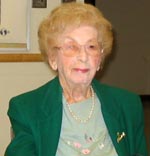
|
MEET SOPHIE CHUDACOFF
Our Soph is a walking miracle. A
dynamo of 93, Soph has been working all her adult life, and though she
calls herself retired, a look at her schedule says it just isn't so.
Soph has been a strong and steady influence in fund raising for the very
worthwhile City of Hope, helping her chapter raise over $25 million
dollars to fund cancer research. After close to fifty years, she's still at it! Soph's
life started in Budapest, and has not lost its exotic flavor ... See Soph read this story live, onstage!
|
|
REMINISCENCES
By Sophie Chudacoff
It's 1921
- March! The First World
War is over. My Mother's family, Mother, sister and her family
- a brother and his family
- and all still living in
Budapest. It's been eight years since she's seen them, so my father
suggested she go to visit for a few months. What a wonderful thing
to happen to me - taken out
of school and a trip to Europe at age 9!
I can't remember how
we got to N.Y., but I'm sure it must have been by train. Who flew
in those days?
We boarded the S.S.
Paris on its maiden voyage to Cherbourg, France. There were a
couple of other kids onboard, and the crew saw to it that we had
fun. One day we were on deck and suddenly everyone was dashing to
the side pointing out to sea. Lo and behold, we saw a scary sight-
there in the distance was a ship completely on fire. Can you
imagine the excitement among the passengers?
And the crew was
laughing, very nonchalant. Everyone was very indignant until one
member of the crew said. "Don't panic. It's only the sun setting
on an iceberg." Isn't that a memory to treasure?
______________________
At Cherbourg, we
took the Orient Express to Budapest. En route we had a number of
unusual experiences. When the train made a stop in Basel,
Switzerland, passengers were asked to get off and declare to some
authorities how much money they were taking to the country of their
destination, which in our case was Hungary. My mother got up and
left me on the train sitting by the window so I could see her.
Suddenly, the train
started to move, pulling out of the station. I was terrified.
"Mother! Mother! The train is leaving!"
My mother is
screaming, "Stop! Stop! My child is on that train alone!" And
she's running, trying to catch up.
A uniformed man was
running after her. Finally, catches up and tries to calm her down.
Guess what! The train was only switching tracks, and they'd made no
announcement.
______________________
I was an only child
for fifteen years! Two weeks before my birthday, my mother had a
baby girl, and I was asked to name her. Shirley Temple was the
darling of the town, so of course I named her Shirley, and added the
middle name of Barbara; I don’t know why.
I turned out to be a
great baby sitter. Every time my parents wanted to go out, I had a
party at home. And so Baby Shirley was indoctrinated into night
life at an early age.
One morning, it must
have been a Saturday or Sunday, I had the baby out in her buggy,
walking down the street. As we strolled, a little Italian lady
stopped me and looked lovingly at her. Then she looked at me with a
beatific smile, "Nice baby. Is she your youngest?"
© Sophie Chudacoff, posted with the author's permission |
|



|
|
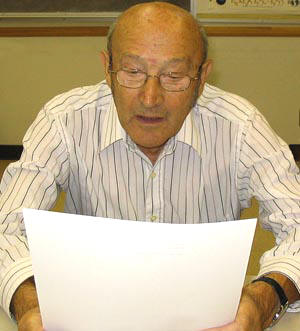
|
MEET DAVID BROOKS
David came to us for classes in
coping with the loss of a spouse, and memoir writing. His own
beloved wife of fifty years had died two years prior to his arrival at our
workshops. They had much in common, including years spent in the
same concentration camp during World War II ...
See David reading selected sections of this story onstage. |
MY LIFE STORY
By David Brook I was born in
Demblin-Jrena,
Poland. I was
the younger of twins. My twin brother died within the week of our birth. I was
named Yisroel-David, was nicknamed and known as Dudek. My mother was Lea, née Sztajngart, and my father Nafiali-Herz
Burkowicz. We were four children: Mark (Moses) the oldest, Pola second, Victor
third, and I was the youngest. Demblin was a small town, put on the map by its
geographic/strategic location – situated centrally in the country, on the
eastern shore of
Poland’s
main river, the
Vistula. It was surrounded by a multitude of military
and other strategic objectives. It had
the largest military airfield, with centers for training of officers, and
pilots. There was a fortress that housed the 5th Infantry Regiment. The 28th
Artillery Division was based across the river, where there were gasoline and munitions
dumps, a military hospital complex; passenger and freight railroad hubs, and
all sorts of supply warehouses, plus two bridges spanning the
Vistula. Irena was a smaller core-township established in the center of
the town of
Demblin,
by various artisan-settlers. Farmland and farming were situated in Demblin. Due to Demblin’s many different military installations, the
military and other government personnel in the area counted in the
thousands. The place experienced a
steadily flowing change in its conscripts, and career officers, from all over
the country, and due to that it took on a miniature metropolitan character. The population grew and prospered. It attracted and supported a
great assortment of artisans, and merchants who provided the sought for
services. My father operated a tailor shop which employed about ten people
on a year-round basis, and more in the busy seasons. They manufactured ladies’
outerwear to order, and alongside of it operated a retail store which was
selling ready-made garments imported from
Warsaw.
The businesses brought in a steady flow of cash daily; my father was a capable
and successful businessman. He kept very little cash on hand, and
systematically invested in real estate. We owned quite a number of rental properties, including the house
we lived in. We possessed expensive jewelry; gold coins such as U.S. dollars,
German marks, Tsarist Russian rubles, and other valuables. Our family was among the more prominent ones in town, socially
and economically. Our residence was apart from the business. It was located on the corner of
Warsaw and Pilsudski
streets, at
39 Warsaw Street. It was in a large building, which also housed
the homes and businesses of two of my father’s sisters, Aunt Dora and her husband
Yidel, and Esther, and Abraham Danowicz, and their families. It also housed a
rental retail store. This property was an inheritance from my paternal grandfather,
and was not owned. It was considered arable land, which Jews could not own. It
was under lease for 99 years. I remember
the lease being renewed maybe two years before the outbreak of the war. My two brothers worked as tailors in the
shop. My mother was a seamstress but was not practicing her trade. In essence, she was a housewife. She was
working, however, on the floor, selling at will or when it was very busy. We’d had a steady maid ever since I can
remember. * * * I had a good, sheltered childhood. I was going to public school,
and to Heder, Jewish school, afterward.
I had many friends, boys and girls, and enjoyed various activities. I belonged to the Betar Zionist Organization. As for my sister, my father had different plans. He wanted her to
be university educated, professional maybe, and to marry a doctor, lawyer or
other professional, probably in
Warsaw. It just so happened, that after my sister finished public school,
a private secondary school, or gymnasium, opened up in Demblin. Naturally, she was among the first to be
enrolled. She was a brilliant student and graduated number one, “A’s” top to
bottom. On the side, she was tutoring Latin, French, and other subjects.
That earned her a nice income and made her financially independent. She was pretty, sociable, active socially and
had a very refined personality. Our home was a meeting place for young people of the town, often
to plan and organize all kinds of different social activities like lectures,
discussions, dances, dinners, etc., the proceeds of which went to communal and
charitable purposes. My sister was accepted, and was supposed to begin her studies at
the
University of
Warsaw in September 1939.
She was planning to take me with her, and send me to school there. Alas, all of our planning never materialized. * * * On September 1, 1939,
Germany invaded
Poland. All Polish government
institutions, including the military, were heavily infiltrated by the German
fifth column, and shortly before September 1, 1939, all of Demblin’s Air
Force-based airplanes, except for a few trainers, were ordered disassembled for
overhaul. In the late afternoon of
September 1 we heard the blare of air raid sirens. Looking up toward the sky, one could see two
German reconnaissance planes, flying at very high altitude, above our town's
particularly high level of strategic targets. They just flew over without any incident. The following morning the air
raid sirens sounded again. We, my family
and I, ran out of the house, and into the bomb shelters we were made to dig
just before the war started. After a
short while the first squadron of German bombers arrived. I saw two Polish airplanes trying to
intercept the bombers, but seconds later saw them spiraling down towards the
ground. The bombers kept coming, wave
after wave, with short intervals, criss-crossing the sky unhindered. They began by bombarding the most outlying
objectives, closing in towards town.
Looking around, all I could see was smoke, and fires. We could feel the earth shaking beneath
us. This intense bombardment continued
until late in the afternoon. The town
was spared, however. When it finally
ended, my father hired a horse and wagon, loaded up some merchandise, and some
personal things, and together with my mother’s brother’s family, we left
Demblin to escape the horrors of bombardments. That evening the vast majority of
the population left Demblin. Most went
to Riki, eight kilometers distant. We
rode all night to a place called Kock, 45 km. away. My father had some distant family there. The place was strategically
insignificant; it did not even have a
paved road. We hoped to be safe there. But, lo and behold, the following
Saturday the German bombers came there.
We ran out into an open field, and huddled against a wall of a barn. All of a sudden my brother Victor rose up
raving, almost berserk, urging us to get away from where we were. No sooner did we leave than the barn
sustained a direct hit. Figure that out! In the evening we packed a few
things, and walked to a town called Ciemierniki, again hoping to escape the
bombardments. But they followed us
again. We learned that nearby, there was
a village, Piaski, inhabited by ethnic German colonists. We decided to go there, fully confident that
we would not be bombarded. Indeed, I had
seen the crews of the low-overflying aircraft exchange hand-waves with the
locals below. It was harvest time, and I helped
out by working for our farmer hosts in the field, thus earning my keep. We stayed there until we heard that the
Polish Military was completely destroyed, and the Germans were speedily
occupying the land. We returned to Kock, with the
intention of going back home to Demblin, which was already German-occupied. Shortly before the outbreak of
the war, Germany and Russia concluded a non-aggression pact, by which the
Russians were to occupy the eastern part of Poland, up to the river Bug. Thus, Poland was being invaded both from the
east and the west. One Polish Army unit
retreating from the east decided not to surrender to the Germans, but to fight
it out with them. A battle ensued between the two armies. For two days an intense exchange of artillery
raged, with us in between them.
Predictably, the Polish Army was defeated, and the Germans occupied
Kock. * * * It was decided that I should go, on
foot, to Demblin, to find out the situation there. The reason that I was picked was I was the
youngest in the family, and maybe stood a better chance of not being bothered
by the Germans. I found our home to be occupied
by German officers, our business broken into, and most of the merchandise
missing. I walked back to Kock, and
after a few days our whole family returned to Demblin. We moved into our place of business. * * * Germany annexed part of
north-western Poland into the Reich, and renamed the rest the General Government, with Hans Frank as
governor, headquartered in Krakow. From the first moment of their
occupation, German soldiers with fixed-bayonet rifles burst into Jewish homes,
taking all able-bodied men to perform forced labor, and roughing them up in the
process. A dusk-to-dawn curfew was
imposed, for Jews only. Any Jew caught
violating the curfew was shot on the spot. My two older brothers decided to
escape to the Russians. They begged my
father that the whole family should escape.
My father refused, claiming it would be irresponsible to leave all of
our amassed assets and go penniless into a self-imposed exile. He conceded that we may have to
live through some harsh times, including forced labor, be forced to move into a
ghetto, lose some freedoms and be subjected to other indignities, but, in the
end, the Germans would be defeated, and we would then resume our normal lives. Alas, he was
terribly wrong and short-sighted! My brothers
escaped to the Russians by themselves. At
some point later the German officers vacated our place of residence and we move
back into it. Soon thereafter the
Gestapo came and confiscated the remainder of our merchandise. Then they came to our house and removed most
of the furniture; demanded our jewelry and other valuables, battering my father
badly in the process, claiming he did not surrender all. And, there I stood riveted to the
floor, trembling cowardly, afraid for my own skin, and scared to intercede for
my father. Ever since, I suffer from a sense
guilt and shame, and often have nightmares involving this incident. * * * My compatriot Polish kids,
voluntarily and zealously accompanied the raiding Germans, pointing out Jewish
homes. The Germans could not tell a Jew from a non-Jew, unless one wore a
beard, peot, or distinctive Hasidic
garb, etc. Yes, it took our Christian
countrymen to point out, and betray the Jew.
I once asked a neighbor kid I grew-up with, went together to school, why
he did it. I pointed out to him, that we are neighbors for many years,
fellow-citizens for almost a thousand of years; that the Germans were our
common enemy, the invaders, occupiers, who wreaked wars and misery upon
Poland for many
centuries past. His retort was that he hated Jews because we killed Christ. Obviously, the Poles hated the
Jews more than their mortal enemies. I am convinced that the first
German word the Pole learned was Jude,
Jew. * * * Forced labor served the Germans,
helping them to achieve their pre-calculated purposes. The most damaging effect it had on the Jews
was of a psychological nature. They made us perform the most
demeaning work, among other things:
clean excrement with our bare hands, pluck the weeds from between the
cobblestones on the market plaza, and many other forms of nonsensical
chores. At other times, I was made to do
work requiring more than none person. All of that was designed to
demean us morally and spiritually, to prove us powerless, break our resistance,
and reduce our dignity to less than human.
At the same time, they exhausted us physically. And they have succeeded
well. © David Brooks, posted with the author's permission |
|


 |
|
Author photo not
available |
MEET MYRA WALD
Myra is a skillful writer who has created
personal and fanciful tales, and composed numerous letters to editors
protesting what she sees as losses in civility in our modern world.
Here's a zesty example of her writings. Enjoy.
|
EQUIS
By Myra Wald
He rode in silence through the
night,
The wind rushing swiftly past
him
And encircled by his groin and
thighs
He felt the splendid power of
the beast.
He galloped with the rhythm of
the form beneath
And thought he was one of
God’s archangels
Riding forth to avenge his
wrongs.
Finally, exhausted and
exhilarated he dismounted,
And covered with sweat and
panting
He pressed his naked body to
the horse
And felt, through the animal’s
soft, warm, hairy naked flesh,
The blood throbbing in its
veins
While the animal twitched and
stomped,
Nerves strung high
recuperating from the frenzied ride.
Next morning he made his
rounds;
Fed his charges and put the
bits into their large, wet tender mouths.
Then he stopped to stroke his
stallion’s nose,
And lovingly reached up to
feel its erect pointed little ears.
Then, shivering with
inarticulate delight
He fantasized his midnight
rendezvous.
But, as he lay upon his pallet
cold and bare
Throughout the night,
Could he cradle to his bosom
words of love the horse had spoken?
Or carry with him through the
day
The knowledge that his horse
would help him?
Neigh!
© Jane Madeline, posted with the author's permission
|


 |
|
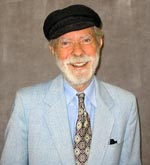
|
MEET HOWARD WESTLEY
A man of many talents, Howard's prowess
extends to being a pilot, musician, and vivid storyteller. See
for yourself with the short piece below, an excerpt of the life story on
which he is working currently. And, as with all our writers on this
"page," watch for many more intriguing
tales in
our second volume of Stories From the Heart.
See Howard read from this story at our live show! |
|
THE
BATTLE OF THE RHINE
By Howard Westley
After the Battle of the Bulge in
early 1945, my outfit, the US Army 34th Troop Carrier
Squadron, no longer had to fly supplies from England to our forces
behind the battle line. The "Red-Ball Express" that trucked
supplies from the French ports took over that job. Ambulances from
the field hospitals at the front now carried wounded soldiers to the
Paris base hospital, so we no longer had to fly the injured to hospitals
in England either.
The 34th was
out of a job, so I signed up for a class at Oxford a few miles from
my base at Aldermaston (15 mi. west of Reading). Bad news
-
the entire squadron was transferred to the air base at Rheims
(southeast of Paris). There we received the CG-4A Glider, and filled
out weight and balance forms.
As we approached our takeoff for the
assault landing across the Rhine River, we loaded 12 airborne
infantry, 452 pounds of dynamite, and took off as numbers 121 and
122 in a long train of gliders, two being towed by a C-47 (a DC-3
with wide doors; they could carry a jeep).
We studied maps of the bend in the
Rhine River and the terrain beyond. We were assigned a certain spot
to try to land in, and were warned not to fly over the high
anti-aircraft gun site (or ack-ack as we called it then) northwest of
Wesel.
The first glider in the
train was led at treetop level, but to stay out of the wake
turbulence (prop wash), the craft following inched higher, until we
were at about 1500 feet. I watched one C-47 to our left, flying
level in the same direction. One moment later, it abruptly nosed
down. One parachute came out the door before it crashed. Ack-ack
-
they were setting up a barrage
-
resembled a thick carpet below us, mostly aimed to explode at the
lower level of the earliest tow-planes or gliders in the train.
I never saw the Rhine River. Was it
haze, or smoke screen? But the message came to disconnect our
tow rope.
Then, where did our circling descent
take us? Directly over the anti-aircraft gun battery we were
supposed to avoid on that high ground! We could see the
gunmen's faces and their German helmets clearly, as they swung their
guns around, continuing to follow our glider after it passed over
them.
Why we didn’t take any hits I'll
never know. Once on the ground, the drogue parachute on the
tail of the glider should have slowed our roll-out. But as I
pulled the "T" handle to release the chute, it broke off in my hand.
Luckily, we had space enough ahead to roll out using our foot
brakes.
Then began the pitched battle....
© Howard Westley, posted with the author's permission |
|
|
|


 |
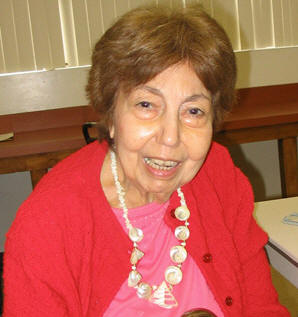 |
Eliza Crawford, a returning
writer, is a resident of Los Angeles who has been attending our Grief
Lifters™ and writing
workshops. Eliza comes from an unusual background.
She is a
British citizen, brought up in India. The stories she writes are of times
spent there, with her husband, who was an important official in the
British Police, often assigned to supervise security for VIP's.
Look for more stories by
Eliza that are already on our
site, and in the first edition of
Stories
From The Heart.
|


 |
GOD SAVED OUR LIVES -
TWICE By Eliza
Crawford Most times when my husband
investigated things, they were upper levels of crime. This time he
had to investigate two foreign criminals who smuggled gold into the
country, and silver out of the country. One was an American and one
was French. They were very bold. My husband had to go where the small
plane on which the smugglers arrived had got stuck in the sand,
abandoned country near the seashore; the only signs of life were a
few dolphins dancing about in the sea. My husband was good enough to take
me and our daughter, who was 6 or 8, because I hinted strongly that
I really wanted to go. I wanted to see this part of India. It was
near the city of Janjira, where they grow nuts and there was a lot
of smuggling going on. I couldn’t go alone or with our daughter so
such places; we’d have been killed. When we got there we had to sleep in
the dark bungalow, where wild animals came at night. I was doing
photography so I got up very early to capture the sunrise. Lo and
behold, there were tents up and gypsies were walking about. My husband got alarmed for us and
sent a constable to us. He saw to it that we took an early exit
from that place. So we left and we were driving slowly. My
husband would not stop ordinarily, but this time we stopped so I
could look at the sunrise. To do that, we had to turn the car in
the opposite direction of where we’d been heading. I finished
taking pictures, and my husband asked the jeep driver to turn back
around and resume our journey. During the rest of the trip we saw
many villagers. Suddenly we came to a place where many of these
people had sticks in their hands and were shouting something and
banging. We all of a sudden realized the ground had shifted and
there was a gap. If we had gone toward it we would have been
killed. As the land shifted, it had created a big landslide. Thank
god we came through alive – in both situations. I learned later that the smugglers
were deported. When my son was sent to America he was studying to
be a doctor. The American smuggler and another man phoned him and
invited him to lunch. Thank God my son had the brains to refuse.
© 2004 Eliza Crawford, posted with the author's permission | |
| |
|


 |
All stories published by permission from the authors. From the edited collection,
Stories From The Heart Volume II
© 2004 Ina S. Hillebrandt
We are
grateful to Ellen Gaines, Director of the Felicia Mahood Multi-Purpose
Center in West Los Angeles for sponsoring our UN-Workshops,™
to Program Director
Sherrie Berlin for all her
generous time and support, and for the help of the dedicated staff at the
City of Los Angeles Department of Recreation and Parks-owned facility.
|
|





|
|
If you'd like to send us your
comments or reviews of these stories, we'd be delighted. Please
use the form below.
|
|
If you'd like to
submit a story of your own for consideration for our site, click the
button below.




|
|
© 2004 Ina Hillebrandt.
Latest update 2014. All rights reserved. |
|

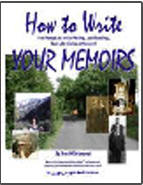




























 |







